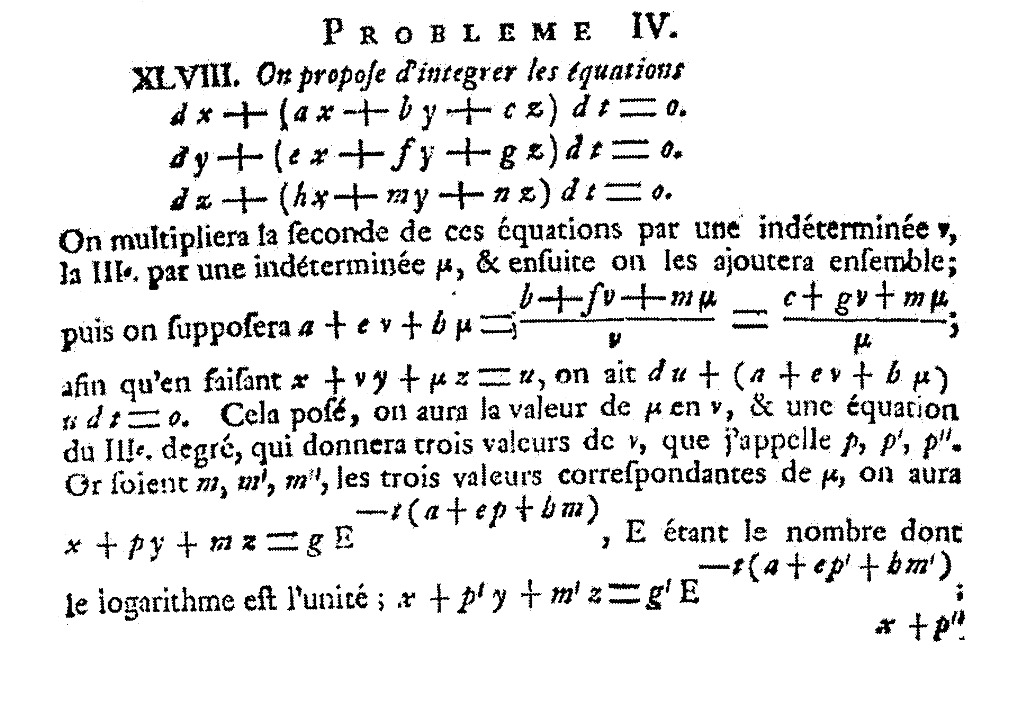- About MAA
- Membership
- MAA Publications
- Periodicals
- Blogs
- MAA Book Series
- MAA Press (an imprint of the AMS)
- MAA Notes
- MAA Reviews
- Mathematical Communication
- Information for Libraries
- Author Resources
- Advertise with MAA
- Meetings
- Competitions
- Programs
- Communities
- MAA Sections
- SIGMAA
- MAA Connect
- Students
- MAA Awards
- Awards Booklets
- Writing Awards
- Teaching Awards
- Service Awards
- Research Awards
- Lecture Awards
- Putnam Competition Individual and Team Winners
- D. E. Shaw Group AMC 8 Awards & Certificates
- Maryam Mirzakhani AMC 10 A Awards & Certificates
- Two Sigma AMC 10 B Awards & Certificates
- Jane Street AMC 12 A Awards & Certificates
- Akamai AMC 12 B Awards & Certificates
- High School Teachers
- News
You are here
Pitfalls and Potential Solutions to Your Primary Source Problems: What’s d’Alembert got to do . . . got to do with it?
It is possible that the early sources contain a method no longer used.
Example
Years ago I felt that I had a great idea for a PSP concerning systems of differential equations with constant coefficients. The first person to solve such a system was Jean le Rond d’Alembert (1717–1783) in 1743, though he gave a better, clearer, solution in his 1750 “Suite des recherches sur les calcul integral” [d’Alembert 1750].


Figure 9. D’Alembert’s system solution. Screenshots supplied by author.
This passage is short, easy to translate, and easy to understand. It uses no college-level mathematics besides knowing that the solution to \(dy/dx =y\) is \(y=e^{x}\), while the modern solution uses matrices, determinants, eigenvalues, and eigenvectors. I suggested creating a PSP around d’Alembert’s elementary solution, but others correctly pointed out that the passage doesn’t really help students learn the expected content. D’Alembert’s method is not useful when the coefficient matrix has repeated or complex eigenvalues, nor when the system is non-homogenous. There is a reason that matrices are the preferred language to describe the method of solution and that d’Alembert’s method didn't “take”.
It may help to know that . . .
- This is a common issue. It is often, or even typically, the case that the first appearance of a technique only solves an “easy” case of a more general problem. Sometimes, when the general solution was found, it expanded upon the simplified version; this would justify using that original source for teaching. Other times (as in the d’Alembert story above), the general solution doesn’t build on what appeared in the original source, and so that source isn't as useful.
- As with other challenges, it is still possible that while the passage isn’t appropriate for your classroom, it can be utilized elsewhere and by others. For example, I plan on giving d’Alembert’s passage to a student, then ask them to figure out how it is related to the matrix method. Perhaps his method can yet be expanded to include cases that d’Alembert hadn’t considered.
Adam E. Parker (Wittenberg University), "Pitfalls and Potential Solutions to Your Primary Source Problems: What’s d’Alembert got to do . . . got to do with it?," Convergence (December 2023)




